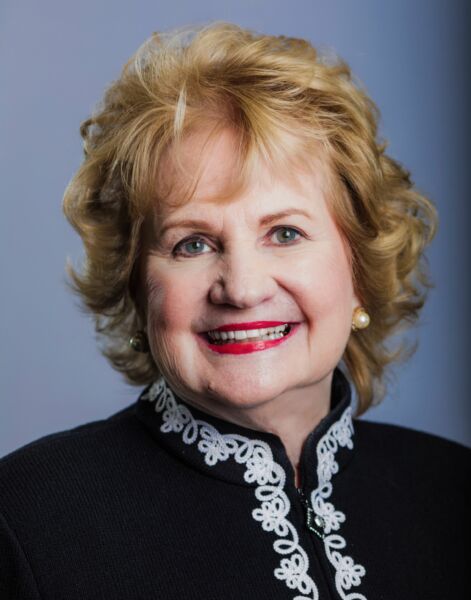Purdue HHS alumna Virginia Jacko exemplifies blindness isn’t a barrier
Written By: Rebecca Hoffa, rhoffa@purdue.edu

Virginia Jacko, president and CEO of Miami Lighthouse for the Blind and Visually Impaired(Miami Lighthouse/Scott McIntyre)
For Purdue University College of Health and Human Sciences (HHS) alumna Virginia Jacko, there are three kinds of people: those who do not see an opportunity, those who see an opportunity but are afraid to act on it, and those who both see an opportunity and act on it. Throughout her life, Jacko has embodied the last, taking advantage of every opportunity, even if it wasn’t what she had planned.
Having served since 2005 as the first blind president and CEO of Miami Lighthouse for the Blind and Visually Impaired, Jacko advocates for those who are blind or visually impaired as she advances the nonprofit’s mission of offering education, training, research and vision enhancement to provide hope, confidence and independence to people of all ages.
As a graduate student in HHS’ financial counseling and planning program, Jacko’s research involved interviewing those who were downtrodden — skills and knowledge that would resurface later in her career.
“To be able to interact with people as part of social service was a different aspect of my career,” Jacko commented, as a former financial analyst, “Little did I know at the time that when I lost my eyesight, social service would become a very important part of what I do.”
After graduating from Purdue with her master’s degree, Jacko started her career at the University in its top-ranked business office and worked her way up to become the senior business manager for the president and provost — what is now the assistant provost for finance and administration. In that role, she worked with some of Purdue’s great leaders, including former Purdue President Steven Beering.
It wasn’t until later in her career at Purdue that Jacko began to lose her eyesight as a result of retinitis pigmentosa, which is caused by a breakdown of the cells in the retina and typically results in decreased vision in low light and loss of peripheral vision that progressively worsens.
She first began to realize her vision loss when she was driving in front of Cary Quad and hit a wooden sawhorse that was in the middle of Stadium Street. Immediately thinking of the alternative — if the object had been a person — she sought treatment at the Bascom Palmer Eye Institute in Miami, Florida. It was there that she received her diagnosis. She called her mother upon leaving the Institute. Jacko said her mother’s response was, “Well, then I’m just going to pray that you do big things for the blind.”
“I only wish my mother were around today to be able to say to her, ‘Mom, I think your prayers were answered,’ because never in my wildest dreams at that point in time could I even understand blindness,” Jacko said in retrospect.
After receiving her diagnosis, Jacko initially went back to her role at Purdue telling no one of her eye condition.
“I pushed myself and pushed myself — I didn’t want to be defined as a person with a vision impairment,” said Jacko.
However, as she noticed her eye condition worsening, she realized that she needed to do things differently. In early 2001, she relocated to Miami to begin vision rehabilitation at Miami Lighthouse for the Blind and Visually Impaired, and after completing her training, she was asked to join the board of directors as treasurer. In 2005, following a national search, she was named president and CEO.
“I realized there was so little for the blind, and too often the blind were only offered sheltered workshop employment,” Jacko recalled. “In contrast, what I saw at Miami Lighthouse were productive people getting integrated mainstream employment, people who were powerful users of the computer, and people who were living independently. So, I said, ‘I am going to dedicate myself to helping the blind.’”
Under Jacko’s leadership, Miami Lighthouse has grown tremendously. When she began as president and CEO, the nonprofit served fewer than 500 program enrollees each year. Today, Miami Lighthouse enrolls 25,000 people annually, and net assets have increased more than fourfold to $51 million.
During her tenure, Jacko has created new programs for children and adults. She founded the Miami Lighthouse Academy LLC, an internationally recognized, first-of-its kind inclusive pre-kindergarten with 50% visually impaired and 50% sighted children. Additionally, in collaboration with Miami-Dade County Public Schools, Miami Lighthouse now offers kindergarten, first and second grade for blind children to prepare them to transition to mainstream learning.
Under Jacko’s leadership, Miami Lighthouse also became one of the first entities to offer nationwide website consultation to ensure compliance with the American with Disabilities Act (ADA) and overcome the digital divide. Three blind computer experts employed by Miami Lighthouse audit websites of businesses, universities, hospitals and more, and have even worked with the White House to ensure its website’s ADA compliance.
Other initiatives include a statewide eye care program for low-income school-age children throughout Florida; an inclusive music program for children, teenagers and adults; a program for seniors offering tactile arts and crafts, peer-mentoring, and health monitoring; and distance learning and in-home support during COVID-19.
Throughout her career, she has put into practice advice from former Purdue President Beering. Following a poor outcome for Purdue after an Indiana legislative session, he told her, “We’ll get them next time.”
“I never forgot his positive outlook,” Jacko said. “Things don’t always go perfectly, but for him to say, ‘We’ll get them next time,’ that was very profound for me. I often say that to myself now: If the desired outcome is not achieved, we’ll get it next time.”
Discover more from News | College of Health and Human Sciences
Subscribe to get the latest posts to your email.